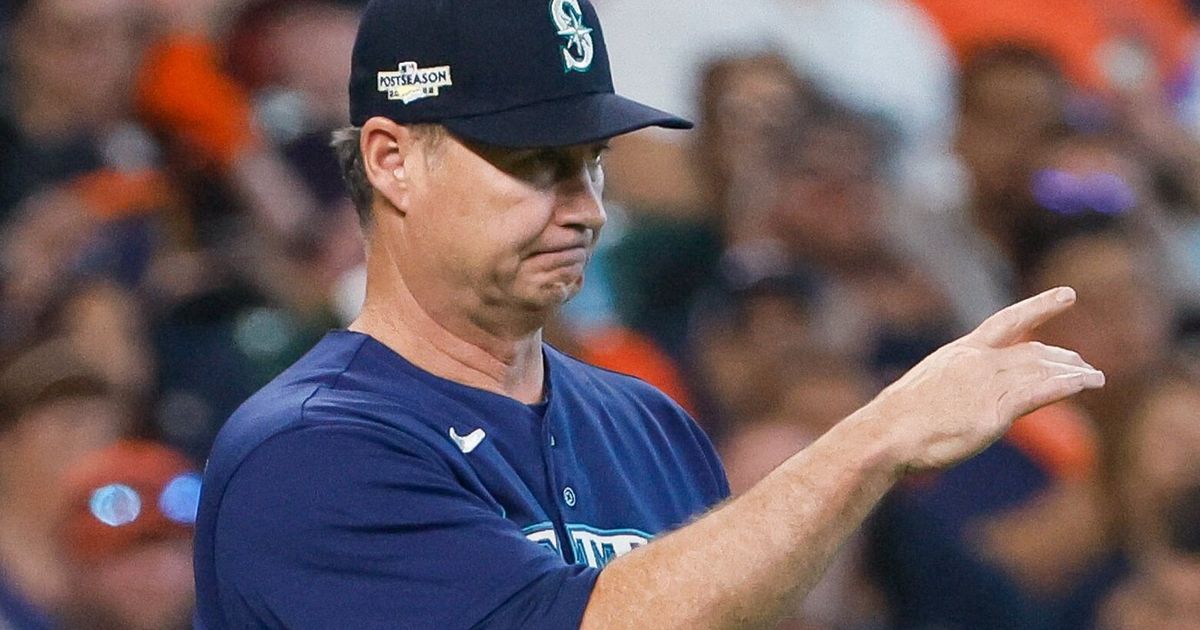
Look at the headline above. It’s a serious question born out of genuine curiosity.
After calling on pitcher Robbie Ray to close out Game 1 of the American League Division Series with two outs in the bottom of the ninth Tuesday, Mariners manager Scott Servais became the leading receiver of ridicule in the Seattle sports scene.
Ray, a starter and reigning AL Cy Young Award winner, had never been in that position before. Additionally, he’d struggled all season vs. the Astros and had been shelled in his previous two outings — including his postseason start vs. the Blue Jays.
So when Yordan Alvarez ripped a three-run homer off Ray’s sinker to give Houston the 8-7 victory, Servais’ choice of pitcher became the primary source of inquiry in Mariners media circles and beyond.
Why Ray? Why then?
Servais didn’t really get into specifics when addressing the media Wednesday. He said repeatedly that the team has a “process” when preparing for each game, that he was “looking at the numbers” that were in front of him, and that he stood by what he felt was a data-supported decision. He declined to give a detailed explanation of the process, or as he put it “how the soup is made” — which is probably best for his team, but not something that is going to satisfy a baffled fan base.
So questions remain. Questions, such as …
Why put a starter who’s never pitched in a save situation in that spot?
This isn’t an unprecedented move. The Dodgers called on Clayton Kershaw out of the bullpen to get the final two outs in Game 5 of the 2017 NLDS, and he delivered. Madison Bumgarner pitched five scoreless innings in relief to beat the Royals 3-2 in Game 7 of the 2014 World Series. And as Servais emphasized Wednesday, Mariners rookie starter George Kirby served as the closer in Seattle’s 10-9 wild card series win over the Blue Jays on Saturday — and he struggled through much of September.
But he hasn’t been struggling quite like Ray — who gave up four earned runs in three innings vs. Toronto on Saturday, five earned runs in 5 2/3 innings vs. Oakland in his previous start, and who has just one quality start in his past seven attempts. So then …
What did Servais like about Ray’s matchup with Alvarez?
Again, not a lot of specifics.
“Robbie Ray’s obviously a very accomplished pitcher. It is left on left, but Yordan Alvarez is very good left on left. We know that going into it,” said Servais, talking about a hitter who hit .321 against southpaws this year vs. .299 against righties. “You have to weigh the odds and where it’s at right there, and again I’m looking at the numbers that are in front of me. I trust them.”
Perhaps one of the numbers Servais looked at was Alvarez having more trouble with a sinker than most other pitches, as he’s hit .268 against them this season with a slugging percentage of .463. This is compared with a .752 slugging percentage against a four-seam fastball and a .663 slugging percentage vs. a slider — Ray’s two best pitches.
But Ray recently incorporated a sinker into his repertoire that he credits for his midseason turnaround. Could that have been part of Servais’ thought process? We don’t know. But you have to wonder how reliable a sinker is in the bottom of the ninth of a playoff game when you’ve been using it for only a few months. In fact, I bet a lot of people are wondering that right now.
I said last night that it’s easy to second-guess a manager post catastrophe. But going with Ray seemed … offbeat before Alvarez took him deep. That said …
What if they had just walked Alvarez?
His season OPS of 1.019 was second only to that of the Yankees’ Aaron Judge, who hit 62 home runs this year. Could you not pitch around him? Servais said no — that he would never want to put the tying run on second base, and I agree with him on that. But it is fair to ask why he didn’t leave in Paul Sewald to close the ninth, given that he had more experience than anybody on the team in that situation. It is fair to wonder why he didn’t turn to another reliable reliever such as Erik Swanson — who has a 1.68 ERA this season — if lefty-righty matchups didn’t matter much with Alvarez. And if they do matter, it is equally fair to wonder why southpaw Matthew Boyd didn’t get the call given that nine of the 10 innings he pitched with the Mariners this year have been scoreless.
There may be reasonable explanations for all of these. Sewald had given up a single and hit a batter that inning, Swanson had an ERA over 5 in the final month of the season, Boyd wasn’t ready for the magnitude of the moment, etc.
Still, it seemed more than a little odd that Servais went with a pitcher who’s been subpar against most teams for the past month, and who has been subpar against Houston all season.
“We made the decision we made based on the players we had available, based on the numbers and the information I had available, and stand by it,” Servais said.
That’s fair. He knows more about baseball than just about anybody who’s questioning him.
But this seems like a situation in which the numbers or the “process” may have caused him to overthink it. Sometimes instinct beats info.
All this second-guessing evaporates if the Mariners go on to win the series. But if they don’t, “What was Servais thinking?” wouldn’t be a question folks ask during this news cycle — it would be one that hangs over his legacy.